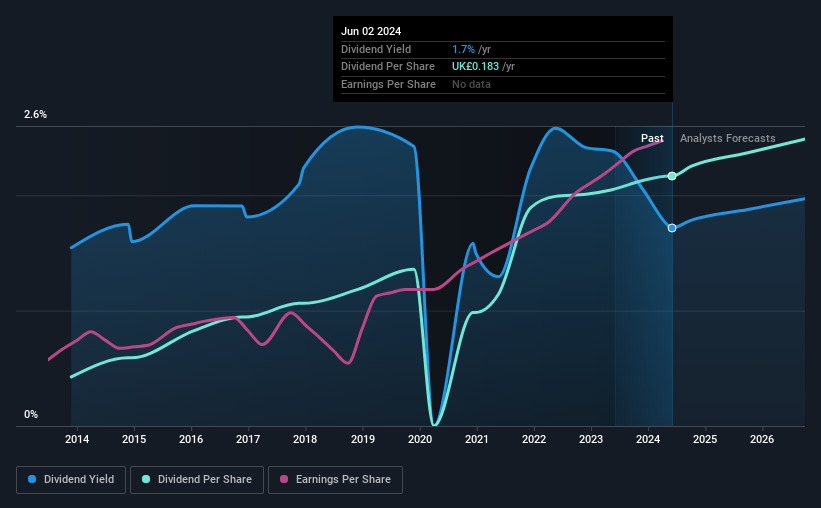Renew Holdings plc (LON:RNWH) Passed Our Checks, And It's About To Pay A UK£0.0633 Dividend
It looks like Renew Holdings plc (LON:RNWH) is about to go ex-dividend in the next 3 days. The ex-dividend date is usually set to be one business day before the record date which is the cut-off date on which you must be present on the company's books as a shareholder in order to receive the dividend. The ex-dividend date is important as the process of settlement involves two full business days. So if you miss that date, you would not show up on the company's books on the record date. Thus, you can purchase Renew Holdings' shares before the 6th of June in order to receive the dividend, which the company will pay on the 10th of July.
The company's next dividend payment will be UK£0.0633 per share, on the back of last year when the company paid a total of UK£0.18 to shareholders. Based on the last year's worth of payments, Renew Holdings stock has a trailing yield of around 1.7% on the current share price of UK£10.68. We love seeing companies pay a dividend, but it's also important to be sure that laying the golden eggs isn't going to kill our golden goose! As a result, readers should always check whether Renew Holdings has been able to grow its dividends, or if the dividend might be cut.
See our latest analysis for Renew Holdings
Dividends are typically paid from company earnings. If a company pays more in dividends than it earned in profit, then the dividend could be unsustainable. Renew Holdings paid out a comfortable 30% of its profit last year. That said, even highly profitable companies sometimes might not generate enough cash to pay the dividend, which is why we should always check if the dividend is covered by cash flow. It distributed 28% of its free cash flow as dividends, a comfortable payout level for most companies.
It's positive to see that Renew Holdings's dividend is covered by both profits and cash flow, since this is generally a sign that the dividend is sustainable, and a lower payout ratio usually suggests a greater margin of safety before the dividend gets cut.
Click here to see the company's payout ratio, plus analyst estimates of its future dividends.
Have Earnings And Dividends Been Growing?
Stocks in companies that generate sustainable earnings growth often make the best dividend prospects, as it is easier to lift the dividend when earnings are rising. If earnings fall far enough, the company could be forced to cut its dividend. That's why it's comforting to see Renew Holdings's earnings have been skyrocketing, up 35% per annum for the past five years. Renew Holdings is paying out less than half its earnings and cash flow, while simultaneously growing earnings per share at a rapid clip. Companies with growing earnings and low payout ratios are often the best long-term dividend stocks, as the company can both grow its earnings and increase the percentage of earnings that it pays out, essentially multiplying the dividend.
Another key way to measure a company's dividend prospects is by measuring its historical rate of dividend growth. Renew Holdings has delivered an average of 18% per year annual increase in its dividend, based on the past 10 years of dividend payments. Both per-share earnings and dividends have both been growing rapidly in recent times, which is great to see.
To Sum It Up
From a dividend perspective, should investors buy or avoid Renew Holdings? Renew Holdings has grown its earnings per share while simultaneously reinvesting in the business. Unfortunately it's cut the dividend at least once in the past 10 years, but the conservative payout ratio makes the current dividend look sustainable. Overall we think this is an attractive combination and worthy of further research.
Wondering what the future holds for Renew Holdings? See what the four analysts we track are forecasting, with this visualisation of its historical and future estimated earnings and cash flow
A common investing mistake is buying the first interesting stock you see. Here you can find a full list of high-yield dividend stocks.
Have feedback on this article? Concerned about the content? Get in touch with us directly. Alternatively, email editorial-team (at) simplywallst.com.
This article by Simply Wall St is general in nature. We provide commentary based on historical data and analyst forecasts only using an unbiased methodology and our articles are not intended to be financial advice. It does not constitute a recommendation to buy or sell any stock, and does not take account of your objectives, or your financial situation. We aim to bring you long-term focused analysis driven by fundamental data. Note that our analysis may not factor in the latest price-sensitive company announcements or qualitative material. Simply Wall St has no position in any stocks mentioned.
